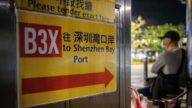【新唐人2012年9月20日訊】由於中國各地的反日活動中,出現打、砸、搶日資商店和焚燒日本汽車的現象,9月18號和19號,數家日本企業暫時關閉了在華的零售店和工廠。同時,中共媒體連續發表文章,建議就算「傷敵一千、自損八百」也要對日本實施經濟制裁。但經濟專家指出,一旦中日之間爆發經濟戰,將沒有真正的贏家。
18號,日本超市業者「永旺 (Aeon) 」已將中國大陸的35家店舖,關閉了30家。另外,便利商店「7-11 (seven eleven) 」198家店舖休業﹔而服裝零售商Fast Retailing關閉了60家優衣庫(Uniqlo)店面,並要求200名日本員工在家待命。青島被縱火的豐田汽車和本田汽車,18、19號暫停了部分中國工廠的運作。還有,馬自達,三菱汽車,松下等等知名日本企業,都暫停了部分在華工廠的生産。
同時,中共媒體建議對日本實施經濟制裁。
《人民日報》海外版,17號發表文章:「中國何時對日扣動經濟扳機」,同一天,中共主要英文報紙《中國日報》(China Daily)也發表了「應考慮制裁日本(Consider Sanctions on Japan)」的文章。
日企相繼關廠後,《央視》以及各地方《衛視》紛紛錄製節目,邀請專家評論「中日開打經濟戰」對兩國的影響,而各專家一致表示,經濟制裁對日本的打擊是致命的,並且對中國影響不大。
美國《華爾街日報》指出,中國對日本實施經濟制裁後,雙方誰受的打擊會更沉重?這個問題還存在爭議,但中日都將受到影響,這一點毋庸置疑。中國一直嚴重依賴日本的投資資本和技術,而且日本是中國第三大出口市場,僅次於美國和歐盟。
經濟專欄作家、北京師範大學MBA導師段紹譯:「抵制日貨會讓日本產品在中國銷量遞減,影響日本的就業、出口、GDP,也同樣會影響中國的…中國的百姓生活水準下降,國民收入下降。因爲這個貿易是雙贏的,只要沒有勉強的自由貿易都是雙贏的。一方得到好處,另一方也得到好處,所以抵制日貨實際上是一個損人損己的行爲。」
時事評論員陳志飛指出,從中長期看,中日經濟一旦開戰,將給中國的投資環境造成負面形象。
時事評論員陳志飛:「這個雖然說是一個政治事件,但是從經濟發展角度來看,投資環境其實最首要表現在政治體制的穩定,和法律制度的健全。政府現在放任民間這樣做,是有它的政治目地,但是從中長期來看,會傷害日本廠家在中國的利益,也會損害中國的長遠經濟發展。」
英國《金融時報》中文網「投資與財富管理」編輯馮濤撰文指出,中日一旦發生經貿對峙、互打經濟牌,暫且不說誰輸誰贏,正所謂「傷敵一千、自損八百」,到最後這場「戰役」將沒有真正的勝利者。
雖然《人民日報》的文章認為,中國有「傷敵一千、自損八百」的意志和承受力。但是這次「佳能」停工兩天,已經造成2萬2千名員工「帶薪休假」。一旦,各大日本企業真的從中國撤厰,可以想見,大量失業的中國員工,將給中國社會帶來多沉重的壓力!
採訪/朱智善 編輯/尚燕 後製/君卓
Is It Worthwhile to “Hurt 1000 Enemies at the Expense of 800”?
As China’s anti-Japan activities turn ugly and violent,
several Japanese owned plants and stores temporarily shut down on September 18 and 19. State media consequently suggested to impose economic sanctions on Japan even if “it hurt 1000 enemies at the expense of 800″.
However, the economist indicates that an economic war will end up with no winner.
On the 18th, the Japanese retailer Aeon shut down 30 of its 35 stores in mainland China. In addition, 198 “7-11″convenience stores were closed; clothing retailer Fast Retailing closed 60
of its Uniqlo stores and held its 200 Japanese employees on standby at home. Both Toyota and Honda, victims of arson in Qingdao, suspended the operation of some of the Chinese factories. Mazda, Mitsubishi Motors, and Panasonic have also suspended manufacturing in some factories in China.
Meanwhile, the CCP mouthpiece suggested imposing economic sanctions against Japan.
On the 17th, while overseas editions of People’s Daily wrote, “When will China pull the economic trigger towards Japan", CCP’s main English-language newspaper, China Daily, also published the article, “Consider Sanctions on Japan".
Following Japanese companies shutting-down, CCTV and each local TV station produced programs with experts discussing the impact of “the Sino-Japanese economic war." All experts agreed that the economic sanctions on Japan will be a fatal blow for Japan and have little impact on China.
As The Wall Street Journal pointed out, “It’s arguable who would be hit worse. Both economies would suffer for sure. China has relied heavily on Japanese investment capital and technology and Japan is a key export market, its third largest after the U.S. and E.U."
Ref. to polisher: http://blogs.wsj.com/chinarealtime/2012/09/17/whats-at-stake-in-china-japan-spat-345-billion-to-start/
Economic columnist, also a visiting scholar of the MBA program of Beijing Normal University, Duan Shaoyi: 0-0:24 Boycotting Japanese goods will reduce the sales of Japanese products in China, affect employment, exports, and GDP of Japan; It will also affect China such as lower the living standards and people’s income. Free trading, without forcing it, is a win-win situation. Both parties benefit from it.
Boycott Japanese goods will only hurt others
at the expense of one-self.
Commentator Chen Zhifei indicates that in the medium and long term, the Sino-Japanese economic war will lead to a negative image of China’s investment environment.
Current affairs commentator Chen Zhifei: It is a political issue. However, on economic development, investment relies on political stability and a
sound legal system. The government purposely allows the situation to continue this way.
But in the medium and long term, it will hurt the Japanese manufacturers in China, and damage the long-term economic development of China."
Feng Tao, editor of The Chinese Financial Times, stated that with the Sino-Japan trade and economic confrontation, regardless who will win, it is the so-called “Hurt 1000 enemies at the expense of 800″. There will not be a real winner at the end of this “battle".
People’s Daily believed that China has the will and endurance to"Hurt 1000 enemies at the expense of 800″. But when Canon suspended production for two days, 22,000 employees were on “paid leave". If these Japanese companies withdraw from China, heavy pressure of unemployment for
the Chinese society is foreseeable!
採訪/朱智善 編輯/尚燕 後製/






















